Loeb Classical Library Builder (166 vols.)
Digital Logos Edition
Overview
In an age when the Humanities are being neglected more perhaps than at any time since the Middle Ages, and when men’s minds are turning more than ever before to the practical and the material, it does not suffice to make pleas, however eloquent and convincing, for the safeguarding and further enjoyment of our greatest heritage from the past. Means must be found to place these treasures within the reach of all who care for the finer things of life.
—James Loeb
The Loeb Classical Library is an essential set for anyone studying the classics. Conceived of by James Loeb in the early 20th century, the series was designed to make Greek and Latin classics accessible by the amateur reader. Loeb was troubled by the decline in the humanities and believed that there was much value in studying the best works from the past. To make the original languages accessible to someone with little or no training, Loeb paired Greek and Latin texts with English translations on facing pages for easy reference. The iconic print books were created in a size that could easily fit in a pocket for ready access.

- Includes both original-language texts and English translations
- Features iconic editions of classic texts
- Provides a window into the Greco-Roman world
- Title: Loeb Classical Library Builder
- Series: Loeb Classical Library
- Volumes: 166
- Pages: 43,434
- Resource Type: Ancient Texts
- Topic: Literature and the Arts
- Resource ID: {EFD117CC-BDF6-4141-8A78-B4C826D9B75C}
- The Works of Plato (24 vols.) by Plato and translated by W.R.M. Lamb, H.N. Fowler, R.G. Bury, and Paul Shorey
- Pliny’s Natural History (20 vols.) by Pliny the Elder and translated by Harris Rackham, W.H.S. Jones, and D.E. Eichholz
- Dionysius of Halicarnassus’ Roman Antiquities (14 vols.) by Dionysius of Halicarnassus and translated by Earnest Cary
- Polybius' The Histories (12 vols.) by Polybius and translated by W.R. Paton
- Herodotus' The Persian Wars (8 vols.) by Herodotus and translated by A.D. Godley
- Homer’s Iliad and Odyssey (8 vols.) by Homer and translated by A.T. Murray
- Letters of Basil the Great (8 vols.) by Basil of Caesarea and translated by Roy J. Deferrari
- Select Works of Josephus (8 vols.) by Josephus and translated by H. St. J. Thackeray
- Augustine’s Confessions and Select Letters (6 vols.) by Augustine of Hippo and translated by William Watts and James Houston Baxter
- Greek Papyri Collection (6 vols.) by unknown and translated by A.S. Hunt, C.C. Edgar, and D.L. Page
- The Works of Julius Caesar (6 vols.) by C. Julius Caesar and translated by A.G. Peskett, H.J. Edwards, and A.G. Way
- Apollodorus' The Library (4 vols.) by Apollodorus and translated by James George Frazer
- Bede’s Ecclesiastical History (4 vols.) by Bede and translated by J.E. King
- Greek Mathematical Works Collection (4 vols.) translated by Thomas Ivor
- Latin Poets of Late Antiquity (4 vols.) by Ausonius and Claudian and translated by Hugh G. Evelyn White and Maurice Platnauer
- Letters of Pliny the Younger (4 vols.) by Pliny the Younger and translated by William Melmoth
- Select Works of Virgil (4 vols.) by Virgil and translated by H. Rushton Fairclough
- The Ecclesiastical History (4 vols.) by Eusebius of Caeserea and translated by Kirsopp Lake and J.E.L. Oulton
- Works of Prudentius (4 vols.) by Prudentius and translated by H.J. Thomson
- Boethius’ Theological Tractates and Consolation of Philosophy (2 vols.) by Boethius and translated by H.F. Stewart and E.K. Rand
- Clement of Alexandria (2 vols.) by Clement of Alexandria and translated by G.W. Butterworth
- Hesiod, the Homeric Hymns and Homerica (2 vols.) by Hesiod and translated by Hugh G. Eveylyn-White
- Lucretius' On the Nature of Thing (2 vols.) by Lucretius and trnaslated by W.H.D. Rouse
- Manetho’s History of Egypt and Other Works (2 vols.) by Manetho and translated by W.G. Waddell
- Select Letters of St. Jerome (2 vols.) by Saint Jerome and translated by F.A. Wright
- Select Works of Tertullian and Minucius Felix (2 vols.) by Tertullian and Minucius Felix and translated by Gerald H. Rendall
This title is included in the following collections
You can save when you purchase this product as part of a collection.
Classic Catholic Scholarship C...
$3,413.99$3,413.99Classic Scholarship Collection...
$12,102.39$7,299.99

The Works of Plato (24 vols.)
- Author: Plato
- Translators: W.R.M. Lamb, H.N. Fowler, R.G. Bury, and Paul Shorey
- Series: Loeb Classical Library
- Publisher: Harvard University Press and G. P. Putnam’s Sons
- Publication Date: 1914–1935
- Pages: 6,702
Philosopher and mathematician A.N. Whitehead once claimed that “the safest general characterization of European philosophical tradition is that it consists of a series of footnotes to Plato.” It is difficult to disagree with him. Plato wrote seminal works on ethics, political theory, morality, epistemology, and metaphysics. His concept of forms went on to have a great influence on Christian theology in the post-Apostolic period. Many of the ideas that form the basis for Western democracy come from his Republic.
Plato’s works are written as a series of dialogues wherein a number of characters (the chief of which is usually Socrates) discuss various philosophical questions. By both their questions and their answers, the characters explain Plato’s various ideas. Plato’s 25-plus dialogues are the best-known use of the Socratic method—that is, the use of dialogue in teaching. This collection of the works of Plato contains all the dialogues commonly attributed to Plato in their Loeb Classical Library editions, with the original Greek and an English translation side by side.
Individual Titles:
- Euthyphro. Apology. Crito. Phaedo. Phaedrus by Plato and translated by H.N. Fowler
- Euthyphro. Apology. Crito. Phaedo. Phaedrus: Greek Text by Plato
- Theaetetus. Sophist by Plato and translated by H.N. Fowler
- Theaetetus. Sophist: Greek Text by Plato
- Laches. Protagoras. Meno. Euthydemus by Plato and translated by W.R.M. Lamb
- Laches. Protagoras. Meno. Euthydemus: Greek Text by Plato
- Statesman. Philebus. Ion by Plato and translated by H.N. Fowler and W.R.M. Lamb
- Statesman. Philebus. Ion: Greek Text by Plato
- Lysis. Symposium. Gorgias by Plato and translated by W.R.M. Lamb
- Lysis. Symposium. Gorgias: Greek Text by Plato
- Laws, vol. 1 by Plato and translated by R.G. Bury
- Laws, vol. 1: Greek Text by Plato
- Laws, vol. 2 by Plato and translated by R.G. Bury
- Laws, vol. 2: Greek Text by Plato
- Cratylus. Parmenides. Greater Hippias. Lesser Hippias by Plato and translated by H.N. Fowler
- Cratylus. Parmenides. Greater Hippias. Lesser Hippias: Greek Text by Plato
- Charmides. Alcibiades I and II. Hipparchus. The Lovers. Theages. Minos. Epinomis by Plato and translated by W.R.M. Lamb
- Charmides. Alcibiades I and II. Hipparchus. The Lovers. Theages. Minos. Epinomis: Greek Text by Plato
- Timaeus. Critias. Cleitophon. Menexenus. Epistles by Plato and translated by R.G. Bury
- Timaeus. Critias. Cleitophon. Menexenus. Epistles: Greek Text by Plato
- Republic, vol. 1 by Plato and translated by Paul Shorey
- Republic, vol. 1: Greek Text by Plato
- Republic, vol. 2 by Plato and translated by Paul Shorey
- Republic, vol. 2: Greek Text by Plato
Plato (427–347 BC) was born in Athens to an aristocratic family. A student of Socrates until the latter’s death, he also studied the works of Herculitus, Parmenides, and the Pythagoreans. Following the death of Socrates, Plato spent a number of years travelling around the Mediterranean. He eventually returned to Athens and founded a school of philosophy called the Academy (named for the field in which it was located), where he later taught Aristotle.

Pliny's Natural History (20 vols.)
- Author: Pliny the Elder
- Translators: Harris Rackham, W.H.S. Jones, and D.E. Eichholz
- Series: Loeb Classical Library
- Publisher: Harvard University Press
- Publication Date: 1938–1963
- Pages: 5,245
As one of the largest and most comprehensive surviving works from the Roman Empire, Pliny the Elder’s Natural History offers a rare glimpse into the scholarship of the ancient world. In 37 books, Pliny the Elder—not to be confused with his nephew, Pliny the Younger—covers botany, zoology, astronomy, geology, geography, mineralogy, and how each of these interact with Roman life. Pliny the Elder claims to be the only Roman to ever attempt such a massive task, and to this day Natural History is a crucial source of information on the technological advances and nature of the Roman era.
As a naturalist, natural philosopher, naval and army commander, and personal friend of Emperor Vespasian, Pliny the Elder experienced much of the world for himself, but he also knew the importance of using established and trusted sources in scholarship. As a result, Pliny the Elder’s Natural History is essentially a detailed encyclopedia, and every encyclopedia since has followed its form in scope, depth, and use of original and reliable sources. For that reason, this text continues to provide scholars with valuable insights today.
Individual Titles:
- Natural History, vol. 1: Books 1–2 by Pliny the Elder and translated by Harris Rackham
- Natural History, vol. 1: Books 1–2: Latin Text by Pliny the Elder
- Natural History, vol. 2: Books 3–7 by Pliny the Elder and translated by Harris Rackham
- Natural History, vol. 2: Books 3–7: Latin Text by Pliny the Elder
- Natural History, vol. 3: Books 8–11 by Pliny the Elder and translated by Harris Rackham
- Natural History, vol. 3: Books 8–11: Latin Text by Pliny the Elder
- Natural History, vol. 4: Books 12–16 by Pliny the Elder and translated by Harris Rackham
- Natural History, vol. 4: Books 12–16: Latin Text by Pliny the Elder
- Natural History, vol. 5: Books 17–19 by Pliny the Elder and translated by W.H.S. Jones
- Natural History, vol. 5: Books 17–19: Latin Text by Pliny the Elder
- Natural History, vol. 6: Books 20–23 by Pliny the Elder and translated by W.H.S. Jones
- Natural History, vol. 6: Books 20–23: Latin Text by Pliny the Elder
- Natural History, vol. 7: Books 24–27 by Pliny the Elder and translated by W.H.S. Jones
- Natural History, vol. 7: Books 24–27: Latin Text by Pliny the Elder
- Natural History, vol. 8: Books 28–32 by Pliny the Elder and translated by W.H.S. Jones
- Natural History, vol. 8: Books 28–32: Latin Text by Pliny the Elder
- Natural History, vol. 9: Books 33–35 by Pliny the Elder and translated by Harris Rackham
- Natural History, vol. 9: Books 33–35: Latin Text by Pliny the Elder
- Natural History, vol. 10: Books 36–37 by Pliny the Elder and translated by D.E. Eichholz
- Natural History, vol. 10: Books 36–37: Latin Text by Pliny the Elder
Gaius Plinius Secundus (AD 23–79), was a naturalist, natural philosopher, naval and army commander, friend of the emperor, uncle of Pliny the Younger, and an avid writer. When he wasn’t studying or investigating the world around him, he was writing about it. Tacitus, Suetonius, and Pliny the Younger wrote about his life and his major contributions to Roman academia. His writings include History of the German Wars, The Student, On Doubtful Phraseology, Natural History, and other works, all of which are lost besides Natural History. Pliny the Elder died attempting to rescue a family friend from the eruption of Mount Vesuvius. Scholars are uncertain whether he died from the toxic fumes or natural causes.

Dionysius of Halicarnassus’ Roman Antiquities (14 vols.)
- Author: Dionysius of Halicarnassus
- Translator: Earnest Cary
- Series: Loeb Classical Library
- Publisher: Harvard University Press
- Publication Date: 1937–1950
- Pages: 2,963
Dionysius of Halicarnassus wrote Roman Antiquities driven by the purpose of changing the way his people were seen by other cultures. Without a proper account of early Roman history, the Greeks ignored Rome’s noble roots and listened to baseless reports claiming that Rome was founded by homeless wanderers, barbarians, or slaves. Dionysius sought to reconcile Greek readers to Roman rule by providing a thorough and historically accurate account of early Roman history—an area that had been virtually untouched in other writings.
Roman Antiquities looked to prove that the founders of Rome were not nameless nomads, but actually Greeks from well-known tribes. He discusses the bravery and piety of the early Roman leaders who laid the groundwork for the great rulers of the present through the customs and institutions they passed on.
Dionysius proposed that all historians follow his example through two essential principles: choosing subjects that are noble, lofty, and useful enough to be worth writing about, as well as using the greatest care and discrimination to gather source materials. By these means, he acquired the best texts available to assemble one of the only two complete, detailed accounts of early Roman history in existence today.
Individual Titles:
- The Roman Antiquities of Dionysius of Halicarnassus, vol. 1 by Dionysius of Halicarnassus and translated by Earnest Cary
- The Roman Antiquities of Dionysius of Halicarnassus, vol. 1: Greek Text by Dionysius of Halicarnassus
- The Roman Antiquities of Dionysius of Halicarnassus, vol. 2 by Dionysius of Halicarnassus and translated by Earnest Cary
- The Roman Antiquities of Dionysius of Halicarnassus, vol. 2: Greek Text by Dionysius of Halicarnassus
- The Roman Antiquities of Dionysius of Halicarnassus, vol. 3 by Dionysius of Halicarnassus and translated by Earnest Cary
- The Roman Antiquities of Dionysius of Halicarnassus, vol. 3: Greek Text by Dionysius of Halicarnassus
- The Roman Antiquities of Dionysius of Halicarnassus, vol. 4 by Dionysius of Halicarnassus and translated by Earnest Cary
- The Roman Antiquities of Dionysius of Halicarnassus, vol. 4: Greek Text by Dionysius of Halicarnassus
- The Roman Antiquities of Dionysius of Halicarnassus, vol. 5 by Dionysius of Halicarnassus and translated by Earnest Cary
- The Roman Antiquities of Dionysius of Halicarnassus, vol. 5: Greek Text by Dionysius of Halicarnassus
- The Roman Antiquities of Dionysius of Halicarnassus, vol. 6 by Dionysius of Halicarnassus and translated by Earnest Cary
- The Roman Antiquities of Dionysius of Halicarnassus, vol. 6: Greek Text by Dionysius of Halicarnassus
- The Roman Antiquities of Dionysius of Halicarnassus, vol. 7 by Dionysius of Halicarnassus and translated by Earnest Cary
- The Roman Antiquities of Dionysius of Halicarnassus, vol. 7: Greek Text by Dionysius of Halicarnassus
Dionysius of Halicarnassus (c. 60–7 BC) was a Greek historian and teacher of rhetoric. He lived during the rule of the first Roman emperor, Caesar Augustus. For 22 years he studied Latin and taught the art of rhetoric. He pushed away from Aristotle’s concept of mimesis, which advocated for the imitation of nature, and embraced the notion of imitatio, which included the imitation of other authors. Imitatio was embraced by Latin orators and rhetoricians in place of Aristotle’s obsolete method. Dionysius of Halicarnassus’ other works include The Art of Rhetoric, The Arrangement of Words, On Imitation, Commentaries on the Attic Orators, On the Admirable Style of Demosthenes and On the Character of Thucydides.
Earnest Cary earned his PhD from Harvard and went on to be an instructor at Princeton. He translated History of Rome by Dio Cassius.

Polybius' The Histories (12 vols.)
- Author: Polybius
- Editors: E. Capps, T.E. Page, and W.H.D. Rouse
- Translator: W.R. Paton
- Series: Loeb Classical Library
- Publisher: Harvard University Press
- Publication Date: 1922–1927
- Pages: 3,234
Polybius’ The Histories document how men of virtue, piety, and courage transformed the Roman Republic into the West’s first superpower. The Histories covers 264–146 BC and detail how, in just half a century, the ancient Roman Republic surpassed and subdued Carthage and other regional rivals, to become the predominant Mediterranean power. Polybius gives credit to strong leadership, separation of powers (a system admired by framers of the American constitution two millennia later), and an element of geographic and temporal fortune. What survives of his 40 books are a fascinating glimpse into Ancient Greek and Roman culture, politics, and language.
Individual Titles:
- The Histories, vol. 1: Books 1–2 by Polybius and translated by W.R. Paton
- The Histories, vol. 1: Books 1–2: Greek Text by Polybius
- The Histories, vol. 2: Books 3–4 by Polybius and translated by W.R. Paton
- The Histories, vol. 2: Books 3–4: Greek Text by Polybius
- The Histories, vol. 3: Books 5–8 by Polybius and translated by W.R. Paton
- The Histories, vol. 3: Books 5–8: Greek Text by Polybius
- The Histories, vol. 4: Books 9–15 by Polybius and translated by W.R. Paton
- The Histories, vol. 4: Books 9–15: Greek Text by Polybius
- The Histories, vol. 5: Books 16–27 by Polybius and translated by W.R. Paton
- The Histories, vol. 5: Books 16–27: Greek Text by Polybius
- The Histories, vol. 6: Books 28–39 by Polybius and translated by W.R. Paton
- The Histories, vol. 6: Books 28–39: Greek Text by Polybius
Polybius (200–118 BC) was a Hellenistic Greek historian. He is best known for his work, The Histories, which describes the rise of the Roman Republic and contain some of the earliest analysis of separation of powers and mixed constitution. His father was a Greek military commander, and his political ties led to Polybius being arrested and deported to Rome. His high social status protected him from hardship, and he became the tutor of a young Scipio Aemilianus. Upon his release, he had the opportunity to return to his homeland, but had switched his loyalties to Rome and elected to stay. He spent years touring the historical sites he records and interviewing eye-witnesses. He was present at the capture of Carthage by Scipio. Eventually he did return home, charged with instituting the new Roman government in the cities of Greece.

Herodotus' The Persian Wars (8 vols.)
- Author: Herodotus
- Translator: A.D. Godley
- Series: Loeb Classical Library
- Publisher: Harvard University Press
- Publication Date: 1920–1925
- Pages: 2,008
In this eight-volume collection on the Persian Wars, Greek historian Herodotus, the "Father of History," gives a cultured and first-hand examination of the ancient world surrounding the rise and rule of the Persian Empire alongside a concise history and cultural background of Scythia and Egypt. Herodotus, who spent much of his life traveling, was one of the most erudite historians of his time. His historical accounts and cultural depictions are based primarily on his personal experience and supplemented with his historical acumen. This collection is perfect for both expert and casual historians interested in the specific details of the battles from the Persian Wars, and cultural portrayals of significant civilizations from the time period.
Individual Titles:
- The Persian Wars, vol. 1 by Herodotus and translated by A.D. Godley
- The Persian Wars, vol. 1: Greek Text by Herodotus
- The Persian Wars, vol. 2 by Herodotus and translated by A.D. Godley
- The Persian Wars, vol. 2: Greek Text by Herodotus
- The Persian Wars, vol. 3 by Herodotus and translated by A.D. Godley
- The Persian Wars, vol. 3: Greek Text by Herodotus
- The Persian Wars, vol. 4 by Herodotus and translated by A.D. Godley
- The Persian Wars, vol. 4: Greek Text by Herodotus
Herodotus (484–425 BC), born in what is now Turkey, is known as the “Father of History.” He spent most of his life traveling and wrote the most comprehensive historical works from his time, The Histories.

Homer’s Iliad and Odyssey (8 vols.)
- Author: Homer
- Translator: A.T. Murray
- Series: Loeb Classical Library
- Publisher: Harvard University Press
- Publication Date: 1919–1925
- Pages: 2,240
Perhaps the best-known and most influential of the Greek epics, the Iliad and the Odyssey stand in a class by themselves. The poems are the oldest existing works of Western literature. Their style and content played such an important role in shaping subsequent Greek culture that Homer was often called the teacher of Greece. The style of Greek used in the works has become its own form or dialect, known as Homeric Greek. Like the works of Cicero, the Iliad and the Odyssey are studied for their eloquent use of language. Innumerable works of literature, theater, and poetry have been written based on or responding to the Iliad and the Odyssey.
Individual Titles:
- Iliad, vol. 1 by Homer and translated by A.T. Murray
- Iliad, vol. 1: Greek Text by Homer
- Iliad, vol. 2 by Homer and translated by A.T. Murray
- Iliad, vol. 2: Greek Text by Homer
- Odyssey, vol. 1 by Homer and translated by A.T. Murray
- Odyssey, vol. 1: Greek Text by Homer
- Odyssey, vol. 2 by Homer and translated by A.T. Murray
- Odyssey, vol. 2: Greek Text by Homer
Augustus Taber Murray (1866–1940) was born to a Quaker family in New York City. He graduated from Haverford College in 1885 and earned a PhD from Johns Hopkins University in 1890. He also studied at the universities of Leipzig and Berlin. In 1892 he became a professor of Greek at Stanford University, where he remained for the rest of his life. He was also on the managing committee of the American School of Classical Studies in Athens, Greece, for 30 years.

Letters of Basil the Great (8 vols.)
- Author: Basil the Great
- Translator: Roy J. Deferrari
- Series: Loeb Classical Library
- Publisher: G.P. Putnam’s Sons and Harvard University Press
- Publication Date: 1926–1934
- Pages: 1,948
The eight-volume Loeb Classical Library edition of Saint Basil’s Letters offers a sweeping perspective of this great theologian’s thought and work. The Letters are both historically significant and rich in personality, presenting the clearly passionate voice of Saint Basil and demonstrating his brilliant theological reasoning. He addresses all manner of people—governors, monks, family members, doctors, widows, bishops, and entire congregations. His words encourage, admonish, defend, and console. Basil discusses doctrine with influential bishops such as Eusebius, Meletius, and Athanasius but also writes “to the father of a student who has died” and to “a woman in sore distress.” Letters of Basil the Great offers the rare opportunity to delve into the life of a key Church Father through the full corpus of his correspondence.
Individual Titles:
- Letters, vol. 1 by Basil the Great and translated by Roy J. Deferrari
- Letters, vol. 1: Greek Text by Basil the Great
- Letters, vol. 2 by Basil the Great and translated by Roy J. Deferrari
- Letters, vol. 2: Greek Text by Basil the Great
- Letters, vol. 3 by Basil the Great and translated by Roy J. Deferrari
- Letters, vol. 3: Greek Text by Basil the Great
- Letters, vol. 4 by Basil the Great and translated by Roy J. Deferrari
- Letters, vol. 4: Greek Text by Basil the Great
St. Basil the Great (330–379) was bishop of Caesarea and an influential figure in the fourth-century Church. The Orthodox Church reveres him as one of the Three Holy Hierarchs (along with Ss. Gregory Nazianzus and John Chrysostom), and he is commemorated on January 1. He is best known for his monastic Rule as well as his monumental Treatise on the Holy Spirit. His homilies on the six days of creation and the Psalter are also treasured. Also attributed to him is the Divine Liturgy of Saint Basil the Great, used in the Orthodox Church throughout Great Lent as well as on other specific feast days.

Select Works of Josephus (8 vols.)
- Author: Josephus
- Translator: H. St. J. Thackeray
- Series: Loeb Classical Library
- Publisher: Harvard University Press
- Publication Date: 1927–1928
- Pages: 1,936
Throughout history, Titus Flavius Josephus has been known by many titles—scholar, historian, soldier, statesman, Pharisee, and traitor. After being captured by Roman forces led by Vespasian, Josephus claimed that the Jewish Messianic prophecies pointed to Vespasian as the future Emperor of Rome. Two years later, Vespasian did become Emperor, and he granted Josephus his freedom. Josephus took on Vespasian’s family name—Flavius—and became a Roman citizen.
As a historian, Josephus provided invaluable records of the Jewish War, contained here in three volumes. It is believed that the text was originally written in Aramaic and addressed to the Jews living in Mesopotamia, though Josephus later translated it into Greek. Also included in the Select Works of Josephus are his autobiography and Against Apion, which defends Judaism as classical religion and philosophy.
Individual Titles:
- The Life. Against Apion by Josephus and translated by H. St. J. Thackeray
- The Life. Against Apion by Josephus
- The Jewish War, vol. 1: Books 1–2 by Josephus and translated by H. St. J. Thackeray
- The Jewish War, vol. 1: Books 1–2: Greek Text by Josephus
- The Jewish War, vol. 2: Books 3–4 by Josephus and translated by H. St. J. Thackeray
- The Jewish War, vol. 2: Books 3–4: Greek Text by Josephus
- The Jewish War, vol. 3: Books 5–7 by Josephus and translated by H. St. J. Thackeray
- The Jewish War, vol. 3: Books 5–7: Greek Text by Josephus
Titus Flavius Josephus (AD 37–c. 100) also known as Joseph ben Matityahu was a Romano-Jewish scholar, historian, soldier, and Pharisee. He was a well-educated man of priestly descent. He led Jewish forces in the first Jewish-Roman Wars, and after his surrender, he claimed that Jewish prophesy pointed to Vespasian as future emperor. Two years later Josephus’ prediction came true, and Vespasian freed Josephus. Josephus then took on Vespasian’s family name and became a Roman citizen, rejecting his Jewish heritage. He served as an advisor for Vespasian’s son, Titus, and recorded Jewish history. His other works include Antiquities of the Jews.
Henry St. John Thackeray (1869–1930) was a British biblical scholar at King’s College, Cambridge, and an expert on Koine Greek, Josephus, and the Septuagint. His other works include The Relation of St. Paul to Contemporary Jewish Thought, The Letter of Aristeas, and Josephus: The Man and the Historian.

Augustine’s Confessions and Select Letters (6 vols.)
- Author: Augustine of Hippo
- Translators: William Watts and James Houston Baxter
- Series: Loeb Classical Library
- Publisher: Macmillan Co. and G.P. Putman’s Sons
- Publication Date: 1912–1930
- Pages: 1,482
Augustine of Hippo is one of the most important thinkers for Western theology and philosophy. His understanding of the self, of sin, of redemption, and of sanctification set the tone for all subsequent theology. Even those who disagree with him must still interact with the effects of his thought. St. Augustine’s Confessions introduced the idea of the inner self to the world. It was the first work that struggled to understand the inner life—the life of the mind. Its place at the beginning of the development of the autobiography is undeniable. This collection’s other work, Select Letters, contains 62 of Augustine’s letters, showing the various troubles of Augustine’s time and how the great bishop dealt with them.
Individual Titles:
- St. Augustine’s Confessions, vol. 1 by Augustine of Hippo and translated by William Watts
- St. Augustine’s Confessions, vol. 1: Latin Text by Augustine of Hippo
- St. Augustine’s Confessions, vol. 2 by Augustine of Hippo and translated by William Watts
- St. Augustine’s Confessions, vol. 2: Latin Text by Augustine of Hippo
- Select Letters by Augustine of Hippo and translated by James Houston Baxter
- Select Letters: Latin Text by Augustine of Hippo
Augustine of Hippo (AD 354–430) was born in Thagaste, Numidia, in Northern Africa. He studied rhetoric in Carthage when he was 17. As an adult, Augustine abandoned the Christianity of his youth to pursue Manichaeism. Through his Manichaen connections, Augustine became professor of rhetoric at the imperial court of Milan. While in Milan, Augustine was heavily influenced by the bishop of Milan, Ambrose. Influenced by Ambrose and by the biography of St. Anthony, Augustine began exploring Christianity and eventually reconverted. He was baptized in 387 and returned to Africa. There he was ordained and became a well-known preacher and apologist for the Christian faith. He was eventually made bishop of Hippo, an office he held until his death in 430.
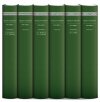
Greek Papyri Collection (6 vols.)
- Translators: A.S. Hunt, C.C. Edgar, and D.L. Page
- Editors: T.E. Page, E. Capps, L.A. Post, E.H. Warmington, and W.H.D. Rouse
- Series: Loeb Classical Library
- Publishers: Harvard University Press, Macmillan Co. and G.P. Putnam’s Sons
- Publication Date: 1932–1941
- Pages: 1,706
Select Papyri contains hundreds of documents revealing the public and private written culture of ancient Greece. Salvaged from rubble, ancient homes, and tombs, these papyri range from personal documents to public records and literature. With these texts, you can examine ancient Greeks’ noteworthy experiences and day-to-day lives. Study what ancient Greeks bought, how they proceeded in court, and how they handled personal disputes or agreements. Read nearly 150 poems, tragedies, and comedies by known and unknown authors, including Sophocles, Euripides, Aeschylus, Plato, and others.
Individual Titles:
- Select Papyri, vol. 1: Non-Literary Papyri, Private Documents translated by A.S. Hunt and C.C. Edgar
- Select Papyri, vol. 1: Non-Literary Papyri, Private Documents: Greek Text
- Select Papyri, vol. 2: Non-Literary Papyri, Public Documents translated by A.S. Hunt and C.C. Edgar
- Select Papyri, vol. 2: Non-Literary Papyri, Public Documents: Greek Text
- Select Papyri, vol. 3: Literary Papyri, Poetry translated by D.L. Page
- Select Papyri, vol. 3: Literary Papyri, Poetry: Greek Text
Arthur Surridge Hunt (1871–1934) was an English papyrologist who recovered a number of papyri from excavation sites in Egypt.
Campbell Cowan Edgar (1870–1938) was a Scottish Egyptologist. He contributed to articles in General Catalogue of Egyptian Antiquities Museum in Cairo on art and Greek culture in Egypt.
D.L. Page was a translator of ancient Greek, known for his translation of Select Papyri, vol. 3.

The Works of Julius Caesar (6 vols.)
- Author: C. Julius Caesar
- Translators: A.G. Peskett, H.J. Edwards, and A.G. Way
- Series: Loeb Classical Library
- Publisher: Macmillan Co., G.P. Putnam’s Sons, and Harvard University Press
- Publication Date: 1914–1955
- Volumes: 6
- Pages: 1,462
Julius Caesar’s accounts of his military campaigns remain classics of Latin prose and important sources for historical reconstructions of the period. The Gallic War recounts Caesar’s conquest of Gaul and his attacks on southern Britain. Civil Wars recounts the battles against Pompey during the Roman civil war. Alexandrian War, African War, and Spanish War recount Caesar’s battles in Alexandria, North Africa, and the Iberian Peninsula, respectively.
Individual Titles:
- Civil Wars translated by A.G. Peskett
- Civil Wars: Latin Text by C. Julius Caesar
- The Gallic War by C. Julius Caesar and translated by H.J. Edwards
- The Gallic War: Latin Text by C. Julius Caesar
- Alexandrian War, African War, Spanish War by C. Julius Caesar translated by A.G. Way
- Alexandrian War, African War, Spanish War: Latin Text by C. Julius Caesar
C. Julius Caesar (100–44 BC) played a central role in Rome’s transition from republic to empire. With Crassus and Pompey, Caesar formed a political alliance that dominated the Roman senate. A general in the Roman army, Caesar led a conquest of Gaul that extended Roman territory to the English Channel and the Rhine. When the senate ordered Caesar to stop his campaign, he led a revolt that led to civil war. After winning the war, Caesar became the leader of Rome. As leader, he centralized the Roman government and increased his own power, becoming the “dictator in perpetuity.” He was assassinated by a group of senators on March 15, 44 BC.

Apollodorus' The Library (4 vols.)
- Author: Apollodorus
- Translator: James George Frazer
- Series: Loeb Classical Library
- Publisher: G.P. Putnam’s Sons
- Publication Date: 1921
- Pages: 949
One of the greatest accomplishments in ancient Greek literature, The Library, provides a plain, thorough summary of Greek mythology and legends. The text draws from the most authoritative literary materials available to the author, and aside from a few minor corrections, the author refused to embellish upon his sources, leaving us with an accurate, concise picture of these Greek tales. Some of these works are found nowhere else, and scholars generally trust their accuracy because other stories were copied from texts that still survive today, including Oedipus Tyrannus by Sophocles, the Alcestis and Medea by Eurpides, the Odyssey, and the Argonautica. In the Loeb Classical Library version, James George Frazer included valuable notes citing the passages where other ancient writers have written about these same tales, and inserted his own insightful comparisons.
Individual Titles:
- Apollodorus: The Library, vol. 1 by Apollodorus and translated by James George Frazer
- Apollodorus: The Library, vol. 1: Greek Text by Apollodorus
- Apollodorus: The Library, vol. 2 by Apollodorus and translated by James George Frazer
- Apollodorus: The Library, vol. 2: Greek Text by Apollodorus
Pseudo-Apollodorus is the name commonly given to the supposed author of The Library. The text was originally attributed to Apollodorus of Athens, a Greek historian and grammarian, but scholars refuted his authorship based on references made by other writers of the time and the radically different style of his known works.
Sir James George Frazer (1854–1941) was a Scottish social anthropologist. He graduated with honors in classics from Trinity College, Cambridge, and was a classics fellow for the rest of his life. He was knighted in 1914. He published over 20 works that he wrote or translated, including The Golden Bough, Folk-lore in the Old Testament, and a translation of Pausianas’ Description of Greece.

Bede’s Ecclesiastical History (4 vols.)
- Author: The Venerable Bede
- Translator: J.E. King
- Publisher: William Heinemann
- Series: Loeb Classical Library
- Publication Date: 1930
- Pages: 1,112
Bede’s writings are known for their theological and historical significance. In Bede’s Ecclesiastical History, you’ll experience Bede’s historical and chronological writings tracking the Christian church through England. Bede pays special attention to the sources of political upheaval in the 600s and outlines the major disagreements between Roman and Celtic Christians. This book is useful for people looking for a brief survey of religious and political figures and events in Anglo-Saxon history.
Individual Titles:
- Baedae Opera Historica, vol. 1 by Bede and translated by J.E. King
- Baedae Opera Historica, vol. 1: Latin Text by Bede
- Baedae Opera Historica, vol. 2 by Bede and translated by J.E. King
- Baedae Opera Historica, vol. 2: Latin Text by Bede
Bede (673–735) was an English monk at the Northumbrian monastery of St. Peter in Wearmouth. Regarded as one of the greatest Anglo-Saxon scholars, he wrote around 40 books dealing with different areas of theology and history.
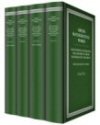
Greek Mathematical Works Collection (4 vols.)
- Translator: Thomas Ivor
- Series: Loeb Classical Library
- Publisher: Harvard University Press
- Publication Date: 1939–1941
- Pages: 1,252
A hallmark of ancient Greek thought is the development of mathematics. Greek mathematics are the foundation upon which all modern-day math is based. The names of ancient mathematicians are still interwoven with their discoveries—Euclidean geometry, the Pythagorean Theorem, and the Archimedean Axiom, testifying to the significance of mathematics’ Greek origins. Selections Illustrating the History of Greek Mathematics is a compilation of texts about the development of Greek mathematics. Translator and compiler Ivor Thomas draws from the works of Greek mathematicians and historians. This compilation furnishes a complete picture of the rise of Greek mathematics. It's of value both to classics scholars and to mathematicians seeking to understand the origins of their study.
Individual Titles:
- Selections Illustrating the History of Greek Mathematics, vol. 1 translated by Thomas Ivor
- Selections Illustrating the History of Greek Mathematics, vol. 1: Greek Text
- Selections Illustrating the History of Greek Mathematics, vol. 2 translated by Thomas Ivor
- Selections Illustrating the History of Greek Mathematics, vol. 2: Greek Text

Latin Poets of Late Antiquity (4 vols.)
- Authors: Ausonius and Claudian
- Editors: E. Capps, T.E. Page, W.H.D. Rouse, and G.P. Goold
- Translators: Hugh G. Evelyn White and Maurice Platnauer
- Series: Loeb Classical Library
- Publisher: G.P. Putnam’s Sons and Harvard University Press
- Publication Date: 1919–1922
- Pages: 1,570
Latin Poets of Late Antiquity brings you two well-known Latin poets: Ausonius and Claudian. Ausonius was highly praised by his contemporaries—some of whom were his former students—and adored by fourth century critics. His most famous poem, Mosella, was equated with the works of Virgil. Today, his works offer a glimpse into the popular poetic modes and styles of his time, in an easily readable sample of Latin literature. Ausonius developed a reputation as a skilled teacher, drawing many pupils and eventually becoming the tutor of emperor Valentian I’s son, Gratian. For his exceptional service, Valentinian bestowed on him the title of quaestor, and when Gratian became emperor in 375, he awarded Ausonius the highest honors, including praetorian prefect of Gaul, and eventually consulate—the highest Roman honor. After Gratian was assassinated in 383, Ausonius withdrew to live a quiet life at his estate, focusing on his writing and poetry.
Despite Greek being his native tongue, Claudian was the last known Latin poet of classical Rome, and one of the greatest Latin poets of late antiquity. He was a court poet for Emperor Honorius, so many of his works were politically oriented, praising his patrons and attacking their adversaries. His elegant writing and skill in storytelling in some cases resulted in unmatched polemic poetry. However, Claudian’s reputation as a poet wasn’t solely based on his political work. His unfinished epic, De raptu Proserpinae, influenced poets and painters for hundreds of years after his death.
Individual Titles:
- Ausonius, vol. 1 & 2 by Ausonius and translated by Hugh G. Evelyn White
- Ausonius, vol. 1 & 2: Latin Text by Ausonius
- Claudian, vol. 1 & 2 by Claudian and translated by Maurice Platnauer
- Claudian, vol. 1 & 2: Latin Text Claudian
Decimius Magnus Ausonius (ca. AD 310–395) was a Latin poet and rhetoric teacher in France. He tutored Emperor Gratian before he came to power, and for his services Gratian granted him the consulship. His poetry was highly popular during his lifetime and remains a prime example of the poetic taste of Rome’s late history. When Gratian was assassinated in a revolt, Ausonius stayed in his country estates to write until his death.
Claudius Claudianus (ca. AD 370–404) was a Latin poet in the court of Emperor Honorius. He primarily wrote poems for Honorius, poems for General Stilicho, and mythological epic poetry. His poetic prowess earned him the rank of vir illustris, a statue in his honor, and a wealthy wife.

Letters of Pliny the Younger (4 vols.)
- Author: Pliny the Younger
- Editor: W.M.L. Hutichinson
- Translator: William Melmoth
- Series: Loeb Classical Library
- Publisher: Macmillan Co. and G.P. Putnam’s Sons
- Publication Date: 1915
- Pages: 975
Over the course of his career, Pliny the Younger served as a high-ranking official during the reigns of three Roman emperors, including the tyrannical Domitian. He witnessed the eruption of Mt. Vesuvius, which destroyed Pompeii and Herculaneum and claimed the life of Pliny’s uncle, Pliny the Elder. These, and a wealth of other experiences, make Pliny the Younger’s Letters a fascinating lens into the ancient world.
Included in these four volumes are Pliny’s personal correspondence with significant historical figures like Emperor Trajan and Tacitus the historian. Interestingly, most of these letters were originally written with the intention of some day being published. As an orator and a writer, Pliny sought to emulate Cicero, and the result was a series of highly literary letters that now offer insightful discussions of imperial life and political issues.
Individual Titles:
- Letters, vol. 1 by Pliny the Younger and translated by William Melmoth
- Letters, vol. 1: Latin Text by Pliny the Younger
- Letters, vol. 2 by Pliny the Younger and translated by William Melmoth
- Letters, vol. 2: Latin Text by Pliny the Younger
Gauius Plinius Caecilius Secundus (AD 61–ca. 112) was a lawyer, author, and magistrate of Rome. Raised by his uncle, Pliny the Elder, he received an excellent education and rose beyond the typical ranks of the equestrian social class. He was elected quaestor in his late twenties, and proceeded to rise in rank throughout the reigns of emperors Domitian, Nerva, and Trajan, serving as praetor, prefect, consul, augur, a member of judicial court, and imperial governor, among other positions.

Select Works of Virgil (4 vols.)
- Author: Virgil
- Translator: H. Rushton Fairclough
- Series: Loeb Classical Library
- Publisher: Harvard University Press
- Publication Date: 1916–1918
- Pages: 1,216
Virgil was one of Rome’s greatest poets. He wrote during the reign of the first Roman emperor, Augustus. Though his life was relatively short—he died at 48—his work left a lasting impression on Western literature. His poem the Aeneid is considered the national epic of Rome. Written after the style of Homer’s Iliad and Odyssey, the Aeneid recounts Rome’s founding myth. The Aeneid, along with his other poetry, became standard in the classroom almost immediately following its publication.
Individual Titles:
- Eclogues, Georgics, Aeneid: Books 1–6 translated by H. Rushton Fairclough
- Eclogues, Georgics, Aeneid: Books 1–6: Latin Text
- Aeneid: Books 7–12, Appendix Vergiliana translated by H. Rushton Fairclough
- Aeneid: Books 7–12, Appendix Vergiliana: Latin Text
Publius Vergilius Maro or Virgil (70–19 BC) was born, according to tradition, in Andes, Gaul. He was educated at schools in Cremona, Mediolanum, Rome, and Naples. Virgil died after visiting Greece to revise the Aeneid. Though Virgil wished to have the poem burned, Augustus ordered that it be printed after his death.
Henry Rushton Fairclough (1862–1938) was born in Barrie, Ontario. He earned an MA from the University of Toronto in 1886 and a PhD in classics from Johns Hopkins also in 1886. He began teaching at Stanford University in 1893, where he remained for the rest of his life. He was awarded an honorary PhD from the University of Toronto in 1922.
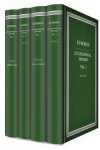
The Ecclesiastical History (4 vols.)
- Author: Eusebius
- Editors: T.E. Page, Edward Capps, William Henry Denham Rouse, L.A. Post, and E.H. Warmington
- Translators: Kirsopp Lake and J.E.L. Oulton
- Series: Loeb Classical Library
- Publisher: William Heinemann
- Publication Date: 1916–1918
- Pages: 1,016
Eusebius, the bishop of Caesarea, gave the church one of its greatest gifts by chronicling the rise of Christianity until the fourth century in The Ecclesiastical History. One of the earliest and most important histories of the church, this classic work is a must read. Eusebius began writing in 311 and finished in 323, just two years before the Council of Nicaea. Comprehensive in its detail and scope and faithful to history, this work forms a solid foundation for the study of church history, historical theology, patristics, and the early church, all of which are integral to a grounded understanding of the New Testament church and the trajectory of its development.
Individual Titles:
- The Ecclesiastical History, vol. 1: Greek Text
- The Ecclesiastical History, vol. 1 translated by Kirsopp Lake
- The Ecclesiastical History, vol. 2: Greek Text
- The Ecclesiastical History, vol. 2 translated by J.E.L. Oulton
Eusebius (263–339) was born in Caesarea Maritime, Palestine. A historian, Christian theologian, apologist, and bishop, he was an essential voice in the First Council of Nicaea in 325. Eusebius, considered the “Father of Church History,” created one of the earliest and most comprehensive chronicles of Christianity. Eusebius also proposed the four-category delimitation (recognized, disputed, spurious, and heretical) for considering a document’s relationship to the Christian canon. Some scholars believe Eusebius may have contributed to the wording of the Nicene Creed, which was based on a creed used in the church he headed as bishop.

Works of Prudentius (4 vols.)
- Author: Prudentius
- Translator: H.J. Thomson
- Series: Loeb Classical Library
- Publisher: Harvard University Press
- Publication Date: 1949–1953
- Pages: 856
The Works of Prudentius is a collection of momentous poems by the fourth-century Roman hymn writer and poet Prudentius. Born into a Christian home, he studied religion, literature, and rhetoric. His poetry was strongly influenced by the Bible, the martyrs, and the works of Tertullian and Saint Ambrose.
His lyrical works have endured—hymns such as “Corde Natus Ex Parentis” (“Of the Father’s Love Begotten”) and “O Sola Magnarum Urbium” (“Earth Has Many a Noble City”) from Liber Cathemerinon remain in use today. Prudentius’ most significant literary contribution, however, is Psychomachia, which is considered the first major work of pure Christian allegory. The tale of virtue versus vice paved the way for works of medieval allegorical literature like The Divine Comedy, Piers Plowman, Everyman, and even Pilgrim’s Progress.
The first volume also includes Prudentius’ didactic works Apotheosis, in which he defends the divinity of Christ, and Hamartigenia, in which he refutes the gnostic dualism of Marcion. The second volume features Peristephanon Liber, 14 hymns describing the acts of mostly Spanish martyrs, as well as Tituli Historiarum, 49 four-line stanzas chronicling iconic Bible scenes.
Individual Titles:
- Prudentius, vol. 1 by Prudentius and translated by H.J. Thomson
- Prudentius, vol. 1: Latin Text by Prudentius
- Prudentius, vol. 2 by Prudentius and translated by H.J. Thomson
- Prudentius, vol. 2: Latin Text by Prudentius
Aurelius Prudentius Clemens was born in 348 in the Roman province of Tarraconensis. He lived mostly in northeastern Spain, but visited Rome between 400 and 405. He became a barrister and later an administrator. Prudentius was a strong Christian who admired the old pagan literature and art, especially the great Latin poets whose forms he used. He viewed Roman achievements in history as preparation for the coming of Christ and the triumph of a spiritual empire.
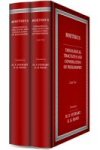
Boethius’ Theological Tractates and Consolation of Philosophy (2 vols.)
- Author: Boethius
- Translators: H.F. Stewart and E.K. Rand
- Series: Loeb Classical Library
- Publisher: William Hienemann
- Publication Date: 1918
- Pages: 424
In this two-volume collection, Boethius demonstrates his prowess as both the last of the Roman philosophers and the first of the scholastic theologians. The Theological Tractates, a well-referenced theological work, displays characteristics of his professional background as a consul. The Consolation of Philosophy was written while Boethius was in jail and soon to be executed. This work is a more personal display of Boethius’ philosophical beliefs and covers his views on fortune, death, and other issues. Boethius clearly defines the intent of his philosophical work as an attempt to explain the nature of the world around us, while the purpose of his theological work is to understand doctrines of divine revelation. With this work, Boethius was able to prepare the way for the coordination of faith and reason in the thirteenth century.
Individual Titles:
- The Theological Tractates and the Consolation of Philosophy by Boethius and translated by H.F. Stewart and E.K. Rand
- The Theological Tractates and the Consolation of Philosophy: Latin Text by Boethius
Boethius (480–524) was brought up in the household of one of the richest and most venerable aristocrats of the time, Symmachus. He married Symmachus’ daughter and pursued a typical career for a senatorial scion of the time, alternating between ceremonial public office and private leisure.
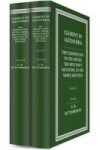
Clement of Alexandria (2 vols.)
- Author: Clement of Alexandria
- Translator: G.W. Butterworth
- Series: Loeb Classical Collection
- Publisher: William Heinemann
- Publication Date: 1919
- Pages: 450
During the second century, Clement of Alexandria—whose real name was Titus Flavius Clemens—taught Christian theology at the Catechetical School of Alexandria and was regarded as the best-educated authority on the works of other authors of his time and before. In this work, he uses not just numerous references and quotes from the Bible and other famous works, but also references to minor authors rarely seen elsewhere. Clement was heavily influenced by Hellenistic philosophy, in particular Plato and the Stoics. This collection includes extensive examination of pagan mythology, philosophical and ethical discussions of wealth, and discussion of the beliefs of Christian heretics.
Individual Titles:
- The Exhortation to the Greeks, The Rich Man’s Salvation, To the Newly Baptized translated by G.W. Butterworth
- The Exhortation to the Greeks, The Rich Man’s Salvation, To the Newly Baptized: Greek Text
Clement of Alexandria (150–215) came from a pagan background in Athens, and his Christian theology was strongly influenced by Greek philosophy. Clement taught at the Catechetical school in Alexandria, Egypt, where he was succeeded by another great teacher, Origen of Alexandria.
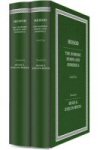
Hesiod, the Homeric Hymns and Homerica (2 vols.)
- Author: Hesiod
- Translator: Hugh G. Eveylyn-White
- Series: Loeb Classical Library
- Publisher: William Heinemann
- Publication Date: 1914
- Pages: 694
This two-volume collection contains the works that represent nearly all that remains of the post-Homeric and pre-academic epic poetry. These extended narrative poems were typically written on topics and events significant to the culture of the ancient Greeks, although Hesiod was exemplified for his epyllion styled poetry which concentrated on Greek mythology. Both the original Greek versions and English translations of works attributed to Hesiod, Homer and other authors with similar writing styles are included in this collection.
Hesiod wrote well-respected works on Greek mythology, farming techniques, economics, astronomy and ancient time keeping. This continuation of the Loeb Classical Library series also includes partial works and Hesiod’s only complete works Works and Days, Shield of Heracles, and Theogony. Other works in this collection include The Marriage of Ceyx, Fragments of Unknown Position, The Melampodia, The Aegimius and Doubtful Fragments, The Homeric Hymns, The Epigrams Of Homer, and more.
Individual Titles:
- The Homeric Hymns and Homerica by Hesiod and translated by Hugh G. Eveylyn-White
- The Homeric Hymns and Homerica: Greek Text by Hesiod
Hesiod was an early Greek poet who presumably lived around 700 BC. Hesiod and Homer are generally considered the earliest Greek poets whose work has survived since at least Herodotus’ time, and they are often paired. Hesiod’s writings serve as a major source on Greek mythology, farming techniques, archaic Greek astronomy, and ancient timekeeping. Of the many works attributed to Hesiod, three survive complete, plus many more in fragmentary state; these include Works and Days, Theogony and The Shield of Heracles.
Homer was an ancient Greek epic poet, traditionally said to be the author of the epic poems the Iliad and the Odyssey. They are commonly dated to the late ninth or early eighth century BC, and many scholars believe the Iliad is the oldest extant work of literature in ancient Greek, making it the first work of European literature. The ancient Greeks generally believed that Homer was a historical individual, but some modern scholars are skeptical; no reliable biographical information has been handed down from classical antiquity.
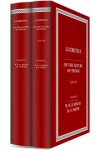
Lucretius' On the Nature of Thing (2 vols.)
- Author: Lucretius
- Editor: Martin F. Smith
- Translator: W.H.D. Rouse
- Series: Loeb Classical Library
- Publisher: Harvard University Press
- Publication Date: 1924
- Pages: 672
Lucretius’ De Rerum Natura (“On the Nature of Things”), his only surviving work, aligns with the Epicurean philosophy against divine intervention, specifically in the context of natural disasters. This book represents the primary source of modern knowledge on Epicurean thought, and it played an important role in the development of Atomism. Lucretius’ purpose was to expand the scientific theories of his contemporary Greek philosophers, while dispelling fear of the gods and death. In this way, Lucretius enabled his readers to attain peace of mind and happiness. His work had a significant impact on the philosophy and literature of his age, and it’s reflected in the writings of Virgil, Cicero, and Horace.
Individual Titles:
- Lucretius’ On the Nature of Things by Lucretius and translated by W.H.D. Rouse
- Lucretius’ On the Nature of Things: Latin Text by Lucretius
Lucretius (99–55) was a Roman poet and philosopher with one known work, De Rerum Natura (“On the Nature of Things”). Very little is known about him outside of this work, although Jerome and Cicero are a few among those who write about him.
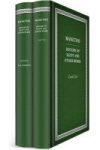
Manetho’s History of Egypt and Other Works (2 vols.)
- Author: Manetho
- Translator: W.G. Waddell
- Series: Loeb Classical Library
- Publisher: Harvard University Press
- Publication Date: 1940
- Pages: 288
Manetho was an Egyptian priest who lived during the third century BC. To acquaint the Mediterranean world with Egypt, he wrote in Greek about Egyptian history, mythology, and antiquities. As a priest, Manetho was afforded unrivaled access to historical records—papyri in the temple archives, hieroglyphic tablets, wall sculptures, and countless inscriptions. Today, what we know of Manetho’s writings is through the works of others, including Jewish historian Josephus, as well as Christian chronographers Eusebius and Africanus. These transcriptions of Manetho’s works are a significant historical source, and are appreciated by those interested in ancient Egyptian civilization, culture, and mythology.
Individual Titles:
- History of Egypt and Other Works by Manetho and translated by W.G. Waddell
- History of Egypt and Other Works: Greek Text by Manetho
Manetho was an Egyptian priest who lived during the third century BC. He is best known for his writings on Egyptian history, as well as his role in introducing the cult of Serapis, a Greco-Egyptian god.
W.G. Waddell taught at the Fuad el Awal University in Cairo, Egypt. He is also the editor of Herodotus: Book II.

Select Letters of St. Jerome (2 vols.)
- Author: Saint Jerome
- Translator: F.A. Wright
- Series: Loeb Classical Library
- Publisher: G.P. Putnam’s Sons
- Publication Date: 1933
- Pages: 542
Saint Jerome’s letters constitute one of the most notable collections in Latin literature. They are an essential source for our knowledge of Christian life in the fourth and fifth centuries. They also provide insight into one of the most striking and complex personalities of the time. Born Eusebius Sophronius Hieronymus, Saint Jerome traveled extensively, studying rhetoric, philosophy, history, and theology. Though he is best known for his translation of the Latin Vulgate, Jerome was a prolific writer whose letters and comments on Scripture have substantially informed our understanding of the early church.
Individual Titles:
- Select Letters of St. Jerome by Saint Jerome and F.A. Wright
- Select Letters of St. Jerome: Latin Text by Saint Jerome
Saint Jerome (Eusebius Sophronius Hieronymus, ca. 345–420) was baptized in 360 by Pope Liberius. He traveled widely in Gaul and Asia Minor, and in 379, went to Constantinople as an ordained presbyter. He was called to Rome in 382 to help Pope Damasus, at whose suggestion he began his revision of the Old Latin translation of the Bible (which came to form the core of the Vulgate version). Wrongly suspected of luxurious habits, he left Rome in 385, toured Palestine, visited Egypt, and then settled in Bethlehem, presiding over a monastery and translating the Old Testament from Hebrew. Saint Jerome was a great scholar and is considered the most learned of the Latin church fathers.
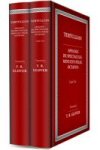
Select Works of Tertullian and Minucius Felix (2 vols.)
- Authors: Tertullian and Minucius Felix
- Translator: Gerald H. Rendall
- Series: Loeb Classical Library
- Publisher: Harvard University Press
- Publication Date: 1931
- Pages: 492
Discover the history of Latin Christendom with two of the first Christian apologists in The Select Works of Tertullian and Minucius Felix. Examine original Latin text alongside its English translation as you study Latin Christendom, its core beliefs, ethics, and the cultural forces of the time. In both Apology and De Spectaculis, Tertullian discusses the life of the time and the influences on thinking and writing in the Latin world. Minucius Felix continues the exploration of Latin Christendom in his Octavius, with a discussion of the social and religious conditions in Rome at the end of the second century, including the interactions between Roman and African Christianity.
Individual Titles:
- Apology, De Spectaculis, Octavius translated by Gerald H. Rendall
- Apology, De Spectaculis, Octavius: Latin Text
Tertullian, (160–225) son of a Roman centurion from North Africa, pursued an education in literature and rhetoric. He practiced law for a while before becoming Christian around the year 197. Shortly after his conversion, Tertullian set himself to defending the Catholic faith against the pagans, as well as heretical Christians.
Minucius Felix was a Roman lawyer and one of the earliest Christian apologists to write in Latin.
Reviews
5 ratings

SEONGJAE YEO
10/5/2019

Kevin Bratcher
6/12/2018

Prayson Daniel
4/4/2016
I am using LOEB Classic online (https://www.loebclassics.com/), I cannot imagine the power one would have having these collection integrated with Logos. I would have acquire these collection if I had the finance in place, but as a student, I cannot. I can only admire it from afar.
Greg F
12/17/2015